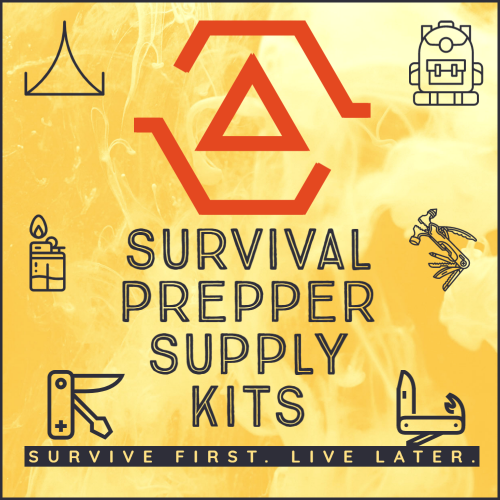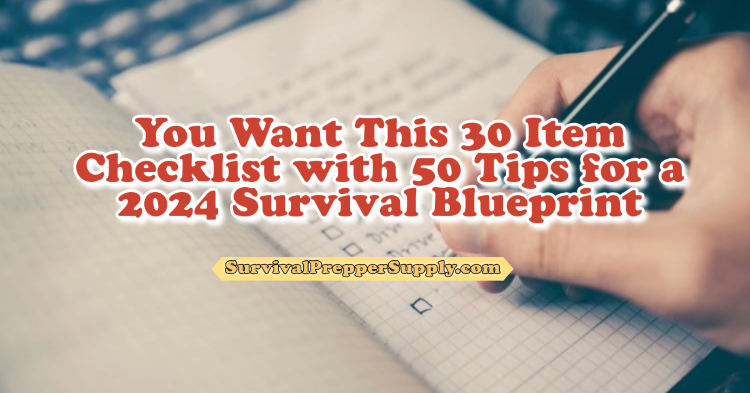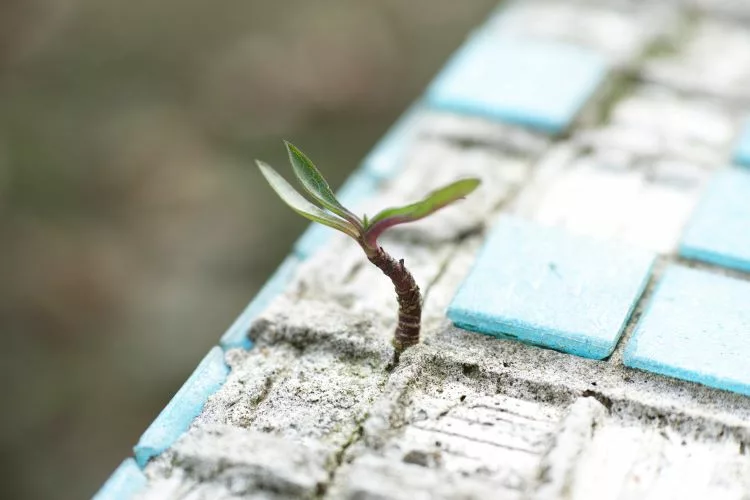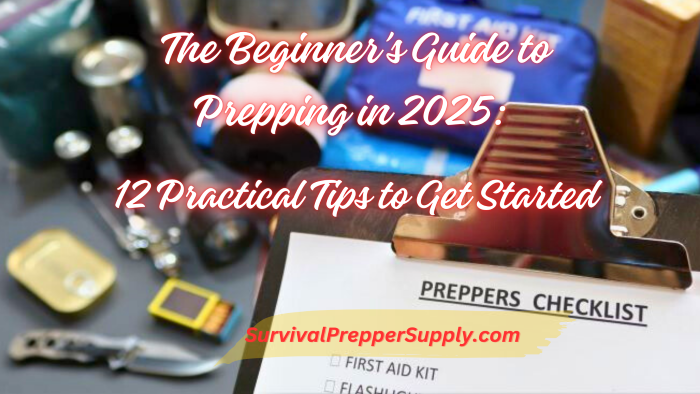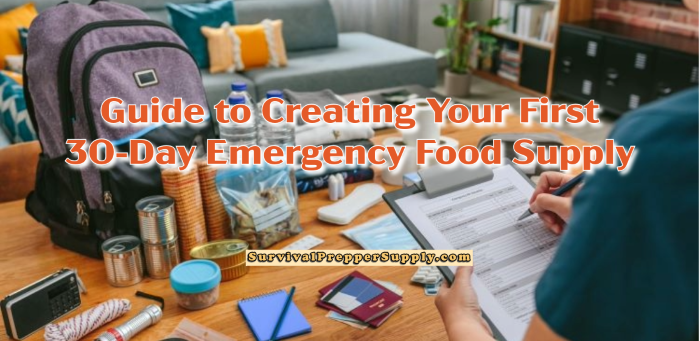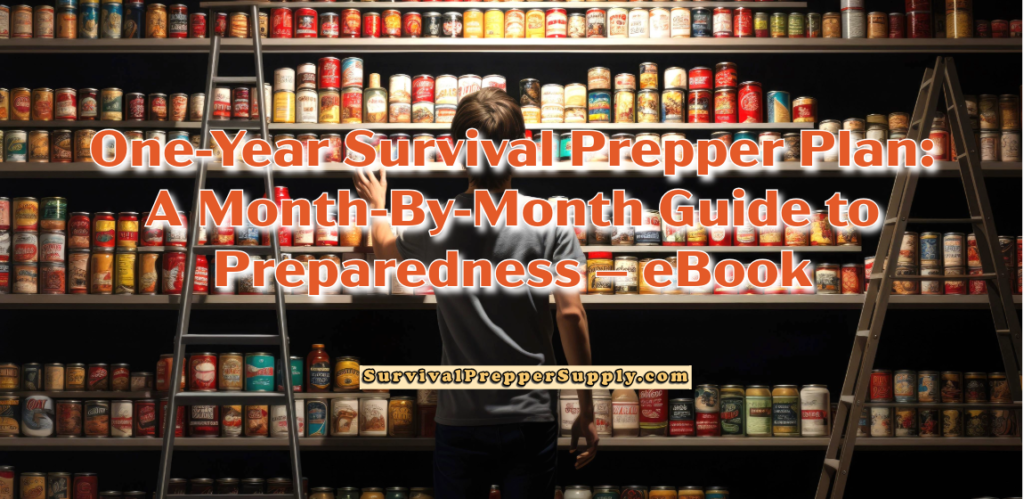We are in an ever-changing world filled with uncertainties, and being prepared for the unexpected is paramount. From natural disasters and economic instability to global health crises, uncertainty is an inevitable part of our lives. The ability to adapt and thrive in these uncertain times depends on our level of preparedness.
Help is here! As we venture into 2024, it’s essential to have a survival blueprint that equips you with the knowledge and skills needed to thrive in various challenging scenarios. Whether you’re new to survivalism or a seasoned prepper, there’s something here for everyone. Let’s go with the details and ensure you’re ready for whatever 2024 throws your way.
1. Create a Disaster Preparedness Plan
Actionable Tip 1: Develop a Family Emergency Plan
One of the first steps towards survival preparedness is to create a family emergency plan. Sit down with your loved ones and discuss how you will respond to various emergencies. Identify roles and responsibilities for each family member and establish clear communication channels.
Actionable Tip 2: Establish Communication Protocols
In a crisis, communication is key. Determine how your family will stay in touch if you’re separated during an emergency. Designate a meeting point and ensure everyone has a list of emergency contacts, including out-of-town relatives.
Actionable Tip 3: Identify Evacuation Routes and Meeting Points
Know the evacuation routes in your area and have multiple options in case some are blocked. Designate meeting points both within your neighborhood and outside of it. These locations should be easily accessible and well-known to all family members.
2. Build a Well-Stocked Emergency Kit
Actionable Tip 4: Include Food, Water, and Essential Supplies
A well-stocked emergency kit is your lifeline during a crisis. Ensure it includes non-perishable food items, a sufficient water supply (at least one gallon per person daily), and essential supplies like blankets, clothing, and hygiene items.
Related – The Basic 7-Step Guide to Survival Prepping
Actionable Tip 5: Don’t Forget Flashlights, Batteries, and a Multi-Tool
Ensure your emergency kit contains a flashlight with extra batteries to navigate in the dark. A multi-tool or Swiss Army knife is invaluable for various tasks, from opening cans to minor repairs.
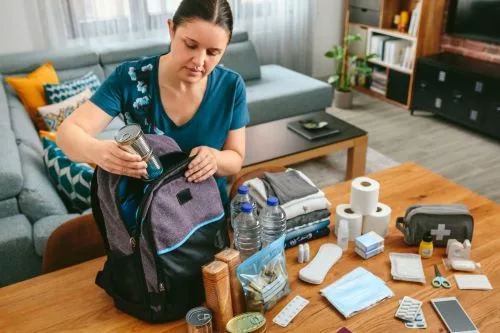
3. Water Purification Skills
Actionable Tip 6: Learn How to Purify Water
Access to clean water is crucial for survival. Learn different water purification methods such as filtration, boiling, and chemical treatment. Practice these techniques to ensure you can obtain safe drinking water in any situation.
4. Food Preservation Techniques
Actionable Tip 7: Master Canning, Drying, and Pickling
Extend the shelf life of your food by mastering food preservation techniques such as canning, drying, and pickling. These methods allow you to store fruits, vegetables, and meats for an extended period without refrigeration.
5. Basic First Aid Knowledge
Actionable Tip 8: Get Certified in Basic First Aid and CPR
Knowing how to provide basic first aid can save lives. Consider taking a first aid and CPR certification course to learn essential life-saving skills.
Actionable Tip 9: Assemble a Comprehensive First-Aid Kit
Create a comprehensive first-aid kit with bandages, antiseptic wipes, pain relievers, and any necessary prescription medications. Regularly check and replenish your kit to ensure its effectiveness.
6. Fire Starting Skills
Actionable Tip 10: Practice Starting Fires
The ability to start a fire is essential for warmth, cooking, and signaling for help. Practice starting fires using various methods, including fire starters, flint, steel, or friction-based techniques like the bow drill method.
7. Shelter Building
Actionable Tip 11: Learn to Construct Temporary Shelters
In emergencies, having the skills to build a temporary shelter from natural materials can be a lifesaver. Learn how to create simple shelters using branches, leaves, and other resources.
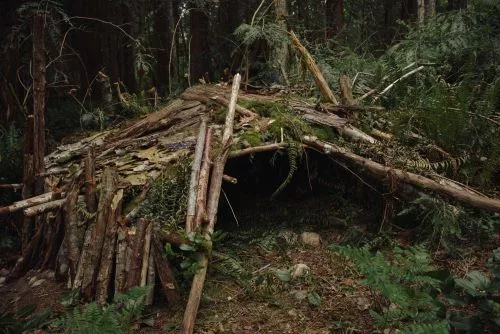
8. Navigation Skills
Actionable Tip 12: Familiarize Yourself with Maps and Compasses
Navigation is critical when you need to find your way in unfamiliar terrain. Learn how to read maps and use a compass for accurate direction finding.
Actionable Tip 13: Develop Map-Reading Skills
Practice map-reading skills to interpret topographic maps, identify landmarks, and plan routes. This knowledge can be invaluable in both urban and wilderness settings.
9. Self-Defense Training
Actionable Tip 14: Consider Self-Defense Classes
In uncertain times, personal safety is paramount. Consider enrolling in self-defense classes to learn effective techniques for protecting yourself and your loved ones.
Related – 8 Kinds of Protective Survival Body Gear, A Buyer’s Guide
10. Survival Psychology
Actionable Tip 15: Understand the Psychological Aspects of Survival
Survival isn’t just about physical skills but also mental resilience. Understand the psychological challenges during a crisis and learn strategies to stay mentally strong.
Actionable Tip 16: Stay Mentally Strong in Stressful Situations
Practice stress management techniques and mindfulness to stay focused and calm during high-pressure situations. A clear mind is your greatest asset in survival scenarios.
11. Wilderness Foraging
Actionable Tip 17: Learn to Identify Edible Plants and Mushrooms
In a survival situation, knowing which plants and mushrooms are safe to eat can provide a valuable food source. However, this knowledge should be gained through hands-on training and expert guidance.
Actionable Tip 18: Understand Which Wild Foods Are Safe to Consume
Always exercise caution when foraging for wild foods. Misidentification can lead to poisoning. Start with easy-to-identify edible plants and gradually expand your knowledge.
12. Hunting and Fishing Skills
Actionable Tip 19: Master the Basics of Hunting and Fishing
Hunting and fishing are valuable skills for sourcing protein in the wild. Learn the basics of firearm safety, tracking, and fishing techniques in your region.
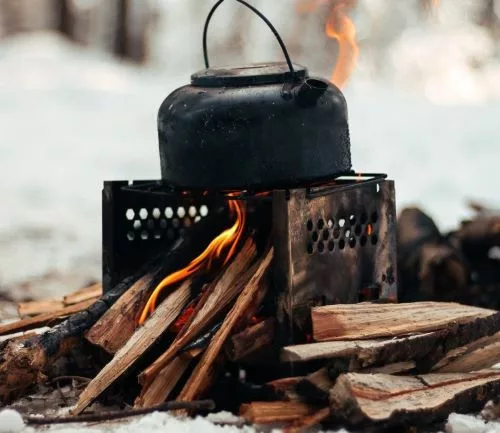
13. Firearm Proficiency
Actionable Tip 20: If You Own Firearms, Become Proficient
If you own firearms for self-defense or hunting, ensure you are proficient in their safe use and maintenance. Seek professional training and familiarize yourself with local firearms laws.
14. Alternative Energy Sources
Actionable Tip 21: Explore Solar Panels and Generators
Investigate alternative energy sources such as solar panels and generators to maintain essential power in case of grid failure. These systems can power lights, appliances, and communication devices.
Related – Ultimate Guide to Generators and Solar Power for Survival Preppers
15. Home Security
Actionable Tip 22: Secure Your Home
Secure your home with quality locks, alarms, and reinforced doors and windows. A secure home is your first line of defense against intruders.
Actionable Tip 23: Consider a Home Security System
Explore the possibility of installing a home security system with monitoring services. These systems provide an extra layer of protection and peace of mind.
16. Financial Preparedness
Actionable Tip 24: Build an Emergency Fund
Financial stability is crucial during uncertain times. Establish an emergency fund covering at least three to six months’ living expenses.
Actionable Tip 25: Diversify Investments
Diversify your investments to reduce risk and protect your wealth from economic instability. Consult with a financial advisor to create a diversified portfolio.
17. Emergency Communication
Actionable Tip 26: Invest in a Ham Radio or Satellite Phone
Standard communication channels may become unreliable during emergencies. Invest in a ham radio or satellite phone for reliable long-distance communication.
18. Learn Basic Plumbing Skills
Actionable Tip 27: Know How to Turn Off Water and Gas Mains
Familiarize yourself with your home’s water and gas supply systems. Learn how to shut off water and gas mains in case of leaks or emergencies.
Actionable Tip 28: Fix Common Plumbing Issues
Acquire basic plumbing skills to address common issues such as leaks, clogs, and pipe repairs. These skills can prevent significant water damage in your home.
19. Cultivate a Survival Garden
Actionable Tip 29: Grow Your Vegetables and Herbs
Growing your food is a sustainable way to ensure a constant fresh produce supply. Start a survival garden with a variety of vegetables and herbs.
Actionable Tip 30: Understand Crop Rotation and Soil Management
Maintain soil health by practicing crop rotation and soil management techniques. Healthy soil yields better harvests and enhances your long-term food security.
Related – What Is Permaculture in Survival?
20. Water Collection Systems
Actionable Tip 31: Install Rain Barrels or Water Collection Systems
Collecting rainwater in barrels or other water collection systems is an eco-friendly way to supplement your water supply. Ensure these systems are properly maintained and filtered for safe use.
Related – A Survival Water Storage Guide to Using Rainwater for Simple Living
21. Alternative Transportation
Actionable Tip 32: Have a Bicycle as an Alternative
In case of fuel shortages or transportation disruptions, having a bicycle can be a lifesaver. It’s a reliable mode of transportation for short to medium distances.
22. Community Building
Actionable Tip 33: Form or Join a Local Survivalist Group
Consider joining or forming a local survivalist group or neighborhood watch. Community support can be invaluable in times of crisis.
23. Health and Fitness
Actionable Tip 34: Maintain Physical Fitness
Regular exercise is crucial for overall health and stamina. Keep yourself physically fit to handle the demands of survival situations better.
Actionable Tip 35: Focus on a Healthy Diet and Lifestyle
A balanced diet and a healthy lifestyle contribute to your overall well-being. Prioritize nutrition and self-care to stay in peak condition.
24. Learn Essential Knots
Actionable Tip 36: Master a Range of Knots
Knowing how to tie various knots is a valuable skill for securing shelter, gear, and tools. Practice tying the square knot, clove hitch, and bowline.
Related – 10 Beneficial Ways to Use Knots for Survival

25. Solar Cooking
Actionable Tip 37: Invest in Solar Ovens or Cookers
Solar ovens and cookers harness the power of the sun for cooking food. They are eco-friendly and sustainable alternatives to traditional cooking methods.
26. Stockpile Essential Supplies
Actionable Tip 38: Accumulate Non-Perishable Food
In addition to your emergency kit, gradually accumulate a stockpile of non-perishable food items, including canned goods, grains, and dried fruits.
Actionable Tip 39: Store Hygiene Products
Maintaining personal hygiene is essential for health—stockpile hygiene products such as soap, toothpaste, and sanitation supplies.
Actionable Tip 40: Other Necessities
Consider your specific needs and stockpile necessities such as diapers, pet food, and baby formula if applicable.
27. Learn Basic Carpentry
Actionable Tip 41: Carpentry Tools
Start by acquiring your essential carpentry tools, such as a saw, hammer, and measuring tape.
Actionable Tip 42: Practice, Practice, Practice
Practice making simple wooden structures like shelves or a small table to build your basic carpentry skills.
28. Learn Bartering Skills
Actionable Tip 43: What Can You Exchange
Identify items or services you can offer in exchange for goods or services you need.
Actionable Tip 44: Engage
Create a list of potential barter partners in your community and engage in discussions about mutually beneficial trades to enhance your bartering skills.
29. Mindful Resource Management
Actionable Tip 45: Do an Energy Audit
Conduct an energy audit in your home to identify areas to reduce energy consumption. Make necessary adjustments, like sealing drafts or switching to energy-efficient appliances.
Actionable Tip 46: Recycle and Compost
Implement a recycling and composting system in your household to minimize waste sent to landfills and reduce your environmental footprint.
Actionable Tip 47: Reduce Waste
Reduce water waste by fixing leaks, using low-flow fixtures, and collecting rainwater for gardening.
30. Stay Informed and Adaptable:
Actionable Tip 48: Be Informed
Set aside dedicated time each day to read news articles, watch informative videos, or listen to podcasts to stay informed about current events and emerging trends.
Actionable Tip 49: Seek Different Perspectives
Actively seek out different perspectives to ensure a well-rounded understanding of complex issues.
Actionable Tip 50: Chill
🙂 Go forth and create your own adventure!
Bonus Tip: Remember, this blueprint is your guide, not your script. Adapt these tips to your own unique journey, embrace your individuality, and trust your intuition. Make 2024 your year of resilience, growth, and thriving this year.
Please don’t hesitate to comment below if you have any further questions, need specific advice on these tips, or have tips you want to share. I’m here to help you make 2024 your best year yet!
I’m the daughter of 2 original survivalists who moved from the north to sunny Florida. My mother, along with her parents, bought 30 mostly uncleared acres in 1938. The first home was made of pecky-cypress and built by a house-raising. My mother raised 10,000 chickens.
My divorced mother met and married my father in 1948. From pine trees on our property, he hand-built a log cabin. He also built a tarpaper-lined 65’x45′ pool with duck pond overflow. We had an artesian well for our water and powering our hand-built waterwheel for the pool. He built a substantial cantilevered roof workshop with a car pit in the massive cement floor.
Since my early teens, I have read a ton of books about survival, prepping, the bomb, an apocalypse, homestead living, and SHTF situations. As an adult, I continue to read sci-fi, survival prepping, and science. I practice a prepper lifestyle albeit a bit modified, read a lot, buy a lot, pack/store a lot of anything survival related.
Read my About Me post for more details on our self-sufficient living. I lived there until I went to college in 1968.
My SurvivalPrepperSupply.com blog strives to educate individuals on coping with natural and human-caused disasters using article posts about preparing for emergencies.
